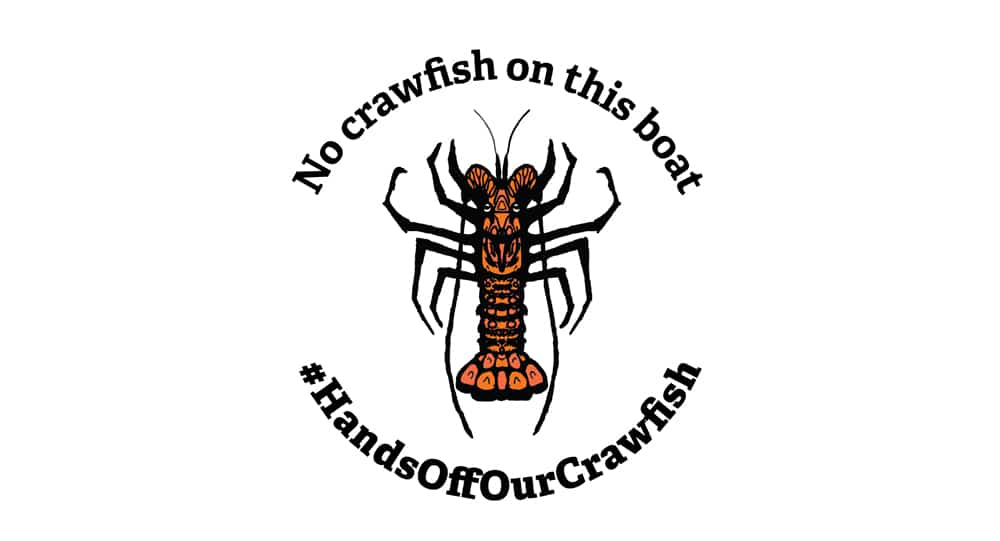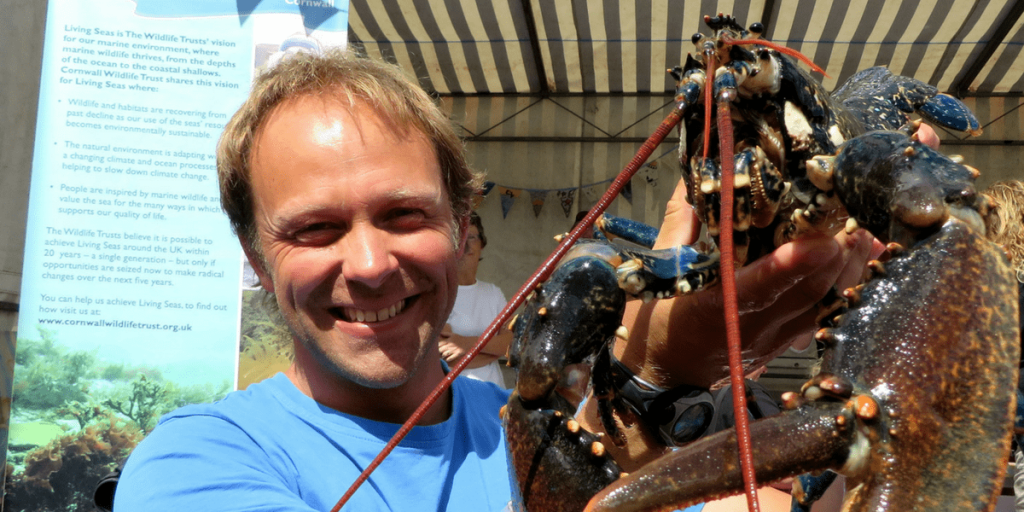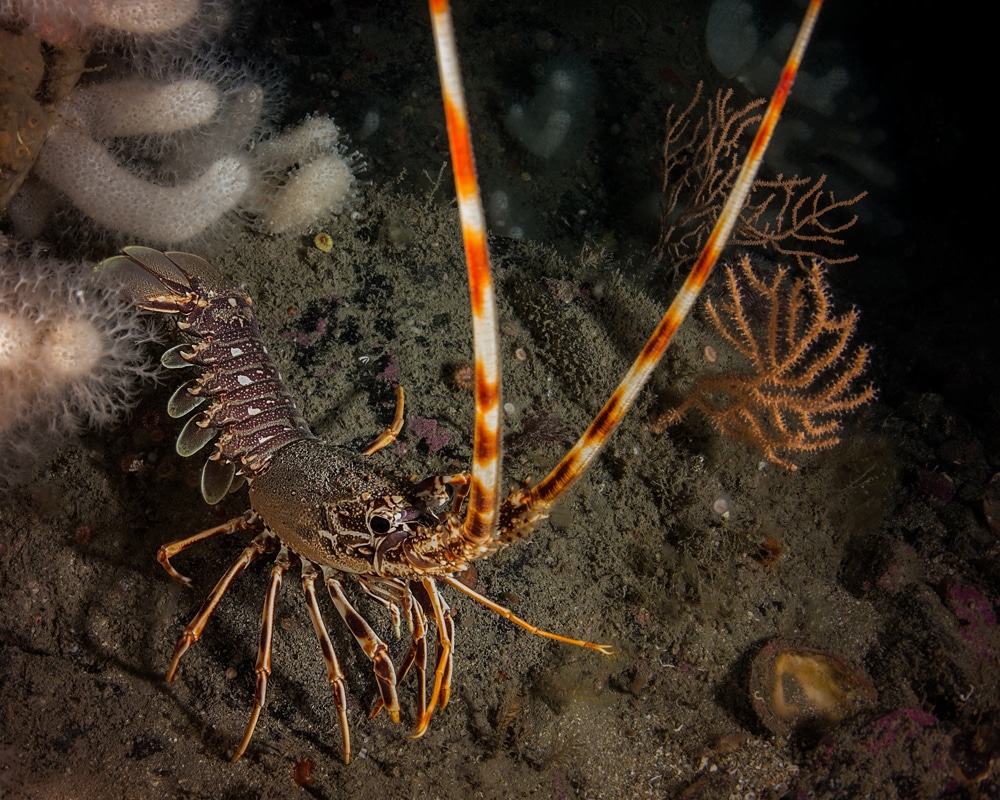Marine Life & Conservation
Divers asked to look after Cornwall’s Crawfish after dramatic comeback

A Cornwall Wildlife Trust initiative introduced by Jeff Goodman
I always thought it was OK to take one for the pot. Diving in the early seventies we hardly ever climbed out of the water without something for our tea. But as the eighties approached I saw less and less marine life as full ‘goody’ bags from divers got bigger and more frequent. I started to feel uneasy about what we were doing to our seas.
Of course commercial fishing and angling have always taken an horrendous toll on marine life but now we as divers were in a position to find and take what was left. There is no finer example to this than the wonderful Crawfish. Along with them the Lobsters and Scallops were equally depleted. Scallops reproduce far quicker than Crawfish and so had a better chance to recover. Lobsters were and are reintroduced by hatcheries in their hundreds of thousands. The Crawfish was ignored and left to simply vanish from the marine ecosystem.
Finally against all the odds, Crawfish are starting to re-appear in Cornish waters and already fishermen and divers are eager to take them.
I spoke with Matt Slater, Marine Awareness Officer for Cornwall Wildlife Trust and as a result he sent me the following article on their new initiative to give these incredible animals a fighting chance. Whether you live in Cornwall or Timbuktu, I urge, no implore you to read this and give it all the support you can.
Matt Slater:
After nearly forty years crawfish have made a dramatic comeback as large numbers of young crawfish have reappeared on wrecks and reefs all around the Cornish shores.
The crawfish or spiny lobster is a spiky and ornate relative of the common lobster, with incredible long antennae and a powerful finned tail. This species was overfished back in the 1970’s and 80’s by both fishermen and divers but in recent years marine conservationists have been thrilled to see their return.
However Cornwall Wildlife Trust is now calling on divers to show that they care about crawfish by pledging not to catch them through a new national campaign called #HandsOffOurCrawfish
They hope through education to get a high proportion of divers supporting this campaign with the eventual aim to see crawfish better protected in our waters, ensuring a sustainable fishery for the species. Dive schools, dive boats and dive clubs will be provided with stickers saying ‘no crawfish on this boat’ and the Trust hopes to provide a much needed clear message for the benefit of these creatures.
Crawfish can live to up to 60 years and are very slow growing. They have long antennae which are used to taste the water to help them look for food as they scavenge on the sea bed.
They also communicate by generating a strange creaking sound by rubbing the bases of their antennae against their shell. This sound can travel for long distances and may play a role in attracting mates.
Matt Slater, Marine Awareness officer for Cornwall Wildlife Trust describes his first encounter with these creatures.
“We dropped down to the seabed on a rocky reef off Newquay that I have dived many times over the years. Where previously I had never seen any crawfish, on this dive within just a few minutes we found 18 beautiful crawfish.”
“Through our Seasearch citizen science project our volunteer divers have recorded huge numbers of crawfish over the past few years in Cornish waters. And we now carry out repeat survey dives for this species at several locations in Cornwall.”
“Divers all around the south west are reporting crawfish at their favourite dive sites and everyone is really pleased to see them back. However, there is a strong concern from many that we must ensure that they are back for good and that fisheries for this species are carried out at sustainable levels to ensure that history does not repeat itself and they become over fished again.”
“The majority of recreational divers appreciate all the marine creatures they encounter and very few collect marine life to eat, preferring to enjoy peaceful encounters and underwater photography. Having said this, many popular dive sites appear to have groups of resident crawfish. If even small numbers of divers start collecting them, it would not take long for them to disappear once again.”
“We already have the support of many of Cornwall’s dive operators and dive schools but we would ask everyone to get involved and to pledge not to take crawfish on their dives – that’s why we started the ‘Hands Off Our Crawfish’ campaign.”
Dive Newquay were the first company to sign up to the campaign. Paddy Maher of Dive Newquay says, “Since we first set up our dive company five years ago we have always made our customers return any collected crawfish back into the sea. No one wants to see these creatures wiped out again as they were in the 1980’s. It makes absolute sense to educate divers and to ask people to think more about their impacts on the underwater world.”
To pledge please visit www.cornwallwildlifetrust.org.uk/crawfishproject Look out for the hash tag #HandsOffOurCrawfish on social media as the Trust hopes divers will share their photos and crawfish news to help spread the word about the project!
This campaign will also be promoted through the national Seasearch programme in Devon, Dorset and the Channel Islands.
Further information
Crawfish or spiny lobster
Palinurus elephas
- These ancient crustaceans are usually found on exposed rocky reefs at depths of at least fifteen meters.
- They are heavily armoured, with sharp spines for defence.
- Unlike lobsters crawfish don’t have large claws instead having spikey front legs.
- Crawfish grow slowly, and can grow to a maximum size of 1 meter living for at least 60 years.
- They take at least three years before they are old enough to breed. Larger females produce far more eggs than smaller ones.
- Crawfish use their spectacular, long antennae to taste tiny amounts of chemicals in water allowing them to detect predators and other mates as well as food.
- Crawfish can communicate using strange creaking sounds that they produce by rubbing the base of their long antennae against each other. This sound can travel for long distances underwater. Some Cornish fishermen actually call crawfish ‘creakers’
Seasearch
- Seasearch is a national citizen science project that trains recreational divers to record marine life and habitats they encounter on their dives.
- The project is led by the Marine Conservation Society and in Cornwall it is coordinated by and funded by Cornwall Wildlife Trust.
Aims of Seasearch
- To encourage the participation of volunteer recreational divers in marine conservation through gathering data, particularly for areas where little data exists or where there is a conservation need,
- To provide training in recording skills to enable volunteer recreational divers to participate in Seasearch,
- To make quality assured Seasearch data available to partner organisations and the general public,
- To raise public awareness of the diversity of marine life and habitats in Britain and Ireland through the dissemination of information gathered and the identification of issues arising from it.
Matt Slater, Marine Awareness Officer CWT

A Cornish Marine biologist and educator, experienced in aquarium and community engagement work. I am passionate about our marine world and love sharing this passion and encouraging us all to take better care for the oceans.
Marine Life & Conservation
Paul Watson Released as Denmark Blocks Japan’s Extradition Bid

Renowned anti-whaling activist Paul Watson has been released from custody in Greenland after spending five months in detention. Denmark’s Justice Ministry rejected Japan’s request for his extradition, citing insufficient guarantees that his time already served in custody would be credited against any potential sentence.
The 74-year-old Canadian-American was arrested on July 21 in Nuuk, Greenland’s capital, when his ship docked to refuel. His arrest was based on a 2012 Japanese warrant related to a 2010 encounter in Antarctic waters. Japan alleged Watson obstructed operations and caused damage to a whaling research ship during efforts to disrupt illegal whaling. Watson has consistently denied these claims, maintaining his commitment to marine conservation.
Denmark, which oversees extradition matters for Greenland, concluded that while the legal conditions for extradition were met, the lack of assurances from Japan regarding time-served credit made extradition untenable.
In a video shared by his foundation, Watson expressed gratitude and relief, saying, “After five months, it’s good to be out… and good to know they’re not sending me to Japan.” He added that the most difficult part of his time in custody was being separated from his two young sons.
Watson is a pioneering figure in marine conservation, known for founding the Captain Paul Watson Foundation in 2022 after decades of activism with the Sea Shepherd Conservation Society. His bold efforts to defend marine life have earned him widespread support, including from celebrities and conservationists. His work has also been featured in the acclaimed reality TV series Whale Wars.
Watson’s lawyer, Jonas Christoffersen, praised the decision, stating, “We are happy and relieved that Paul Watson is now free.” He added that Watson is eager to reunite with his family and continue his vital work.
The arrest occurred while Watson’s vessel, the M/Y John Paul DeJoria, was en route to the North Pacific with a team of 26 volunteers to intercept a Japanese whaling ship. His foundation described the arrest as politically motivated and emphasized that Watson’s actions were focused on ending illegal whaling practices.
Japan resumed commercial whaling in 2019 after leaving the International Whaling Commission, asserting that whale meat is a cultural tradition. Conservationists, however, continue to challenge these practices, highlighting their impact on marine ecosystems.
Despite the challenges, Watson remains steadfast in his mission to protect marine life and bring attention to whaling practices. His dedication to ocean conservation has made him a globally respected advocate for the environment.
Marine Life & Conservation
12 Days of Zero-Waste Fish-mas

This holiday period, the Marine Conservation Society, the UK’s leading ocean membership charity, invites you to make some simple changes to eating fish this Christmas to help our seas.
Dr Kenneth Bodles, Head of Fisheries and Aquaculture at the Marine Conservation Society, said, “During the festive season, our consumption increases, but so does waste. Sustainability isn’t just about where food comes from – it’s also about how you use it. By reducing waste and making the most out of your seafood, you’re not only taking steps to be more ocean-friendly, but can also help to cut costs during what is often one of the most expensive times of the year”.
The Marine Conservation Society has compiled twelve tips on how to consume seafood sustainably with zero-waste this Christmas:
Buy whole fish instead of fillets
Instead of fillets, consider buying whole fish such as salmon, hake, or lemon sole. By adopting a “nose to tail” approach with cooking, whole-baked fish not only feeds a crowd, but also helps to minimise waste and maximise sustainability by using up every part of the animal, including bones, skin, and fat.
Make fish stock
Leftover fish bones or shells can be put to good use by boiling them to make a nourishing fish stock or bisque. This can be frozen and preserved for later use and makes for a flavourful base in a soup.
Make your own fish pâté
Avoid waste by turning leftover fish, such as smoked mackerel or salmon, into a delicious pâté by blending with cream cheese and lemon. Perfect when paired with crackers.
The sustainability of salmon and mackerel varies depending on where and how it is caught or farmed. For more information on green-rated options, check the charity’s Good Fish Guide.
Buy frozen
By purchasing seafood that is frozen or vacuum-packed, this helps to reduce waste by extending the shelf life of your food.
Fish pie
If you’re wondering what to do with leftover cooked fish, why not opt for a classic fish pie with mashed potatoes, leeks, and a cheesy sauce? A sure crowd pleaser on Boxing Day.
Use the head
Don’t forget the fish head! The meat is incredibly tender and flavourful. The charity recommends a cod’s head curry or recreating Fallow’s renowned cod’s head in siracha butter.
By stretching your ingredients further, not only is this a more sustainable way to enjoy seafood, but also cost-effective by repurposing leftovers and cooking creatively.
Boxing Day brunch
Mix leftover kippers or smoked salmon with scrambled eggs for a tasty, zero-waste, Boxing Day brunch.
For best choice, make sure you buy kippers, or herring, from the North Sea and the North Irish Sea.
Zero-waste storage
A top tip from the Marine Conservation Society to avoid waste is freezing fish offcuts to save for future use.
Crisp up the skin
Even leftover fish skin can be turned into a quick savoury snack by crisping it up in an air fryer with a little olive oil and salt.
Anchovies two ways
Leftover anchovies can either be blended with butter to make a delicious anchovy butter or tossed into pasta for a hit of umami flavour.
The charity recommends opting for anchovies caught in the Bay of Biscay for best choice.
Fishcakes
For an easy, zero-waste meal, leftover seafood trimmings can be mixed with mash and fried in breadcrumbs to make fishcakes.
Pickled mussels
Try pickling mussels in 1:1 vinegar and water, with a dash of sugar for a sustainable, zero-waste snack that can be enjoyed well beyond the festive season.
Mussels farmed in the UK are a seafood superhero. Grown using low-impact methods and harvested by hand, they get all the food they need from the sea around them. This makes them one of the most sustainable, ocean-friendly, and cost-effective seafood options.
Players of People’s Postcode Lottery have raised £6.6M towards the Marine Conservation Society’s vital work in making seafood more sustainable.
Laura Chow, Head of Charities at People’s Postcode Lottery, said: “Fish is a festive favourite for many, but making sustainable choices when it comes to how we buy and eat seafood makes all the difference for our ocean. Support from players of People’s Postcode Lottery has helped the Marine Conservation Society further its sustainable seafood work, so that we can all enjoy healthier, better protected seas.”
The Marine Conservation Society encourages you to make sustainable seafood choices a year-round habit, not just for Christmas. To check how sustainable the seafood on your plate is, you can visit the charity’s Good Fish Guide. The Guide helps consumers and businesses identify the most sustainable seafood using a simple traffic light system, based on where and how species are caught or farmed. Green is the best choice, amber means improvements are needed, and red indicates fish to avoid buying.
Zero-waste gift idea
Why not embrace a zero-waste Christmas by gifting a membership to support marine conservation? It’s a meaningful, low-waste gift that helps protect our ocean for generations to come. Memberships start from as little as £5 a month – the price of a sandwich and drink from your local coffee shop.
Find the latest sustainable seafood advice for wild-caught and farmed seafood on the Good Fish Guide, downloadable to your phone from www.mcsuk.org/goodfishguide.
-

 News2 months ago
News2 months agoIconic SS United States to become the World’s Largest Artificial Reef
-

 News3 months ago
News3 months agoBook Review – 52 Assignments: Underwater Photography
-

 Gear News3 months ago
Gear News3 months agoDYNAMICNORD – New German diving brand enters the British market
-

 News3 months ago
News3 months agoExploring Cenote El Pit: A Diver’s Dream
-

 Gear News3 months ago
Gear News3 months agoTry BARE drysuits (and maybe even win one!) this Friday with Sea & Sea at North West Dive Fest
-

 Marine Life & Conservation3 months ago
Marine Life & Conservation3 months agoBook Review: Coral Triangle Cameos
-

 Blogs2 months ago
Blogs2 months agoDive the Egyptian Red Sea this Autumn with Regaldive
-

 News3 months ago
News3 months ago2024 Ocean Art Underwater Photo Competition Announced

















